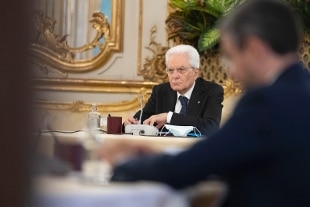Budget bill sent to the Quirinale: Recovery Fund advance fund, 120.6 billion in 3 years
The CDM approves the text of the budget law.
Now it's up to Parliament
Maneuver.
Orlando: we will carefully evaluate Forza Italia's proposals
Maneuver, Gualtieri: "I'm confident, Parliament will improve it"
Share
November 18, 2020 The President of the Republic, Sergio Mattarella, signed the budget bill, authorizing its presentation in Parliament. In particular, the provision will be presented to the Chamber of Deputies, where the process for examination and approval will begin.
The Budget Law had been stamped in the afternoon by the State General Accounting Office. It then passed to the Quirinale for the signature of the President of the Republic in view of the publication of the provision in the Official Gazette. It will then land in the Chamber for the start of the parliamentary procedure.
The provision of 229 articles, one more than the previous drafts, began its process from Montecitorio with a record delay compared to the first go-ahead "subject to agreements" obtained over a month ago. The definitive go-ahead from the Council of Ministers arrived last Monday, delaying the timetable. Parliament's working time is therefore tight to avoid reaching close to the deadline for approval of 31 December.
Recovery Fund advances fund, 120.6 billion in 3 years
The final version of the Maneuver provides for a Fund at the Mef to advance funds from the Next Generation Eu Program, the Revolving Fund for the implementation of the Next Generation Ee - Italy. The budget is 34.775 billion for 2021, 41.3 billion for 2022 and 44.573 billion for 2023: a total of 120.648 billion in the three-year period. Fund resources are paid into two special non-interest bearing current accounts opened at the central state treasury; the first current account, called "Ministry of Economy and Finance implementation of the Next Generation EU - Italy - Non-repayable contributions 'are paid the resources relating to projects financed through this type of contribution, while on the second, called' Ministry of economy and finance implementation of the Next Generation EU - Italy - Loan contributions ", the resources relating to projects financed by loans are paid. These are off-balance-sheet digestions. The resources of the Mef's non-interest bearing current accounts will be transferred, in relation to financial needs, to the administrations or bodies that own the projects, by means of a transfer. Subsequently, the resources disbursed to Italy by the EU will flow into the two distinct chapters relating to grants and loans. With decrees of the Minister of the Economy, the first within 60 days from the entry into force of the Maneuver, the administrative-accounting procedures for managing resources and reporting them will be established. The beneficiary administrations are responsible for the implementation of the projects; with the Dpcm, on the proposal of the Mef, to be always adopted within 60 days, the methods for collecting the implementation data at the level of each project are defined, with reference to the costs, the objectives pursued, the expenditure incurred, the effects on the territories, implementing bodies, implementation times, output and result indicators. By June 30 of each year from 2021 to 2027, the Council of Ministers approves and transmits to the Chambers a report indicating, on the basis of the state of the art, the measures necessary to accelerate the progress of the projects. The projects must be prepared in accordance with the provisions of EU legislation. In the event of revocation, the loans will be reallocated to the Plan. From January a specific mission unit will be set up at the Accounting Office with the task of coordinating, connecting and supporting the structures involved; a three-year post of general managerial level in consultancy, study and research is envisaged, renewable once.
7 thousand companies affected by reductions for aggregations
There are approximately seven thousand companies that could be interested in the incentives for aggregations envisaged by the Maneuver. This is estimated by the Technical Report to the Budget Bill. From the results of the analyzes, the potentially interested parties are 7,065 with a maximum amount convertible into DTA credit of approximately 12.195 billion; applying the IRES rate of 24%, a maximum DTA amount of 2.9 billion is estimated, which on the basis of the credit transformation limit of 2% is reduced to 1.4-1.5 billion. Taking into account the strong incentive nature of the proposal, the tax credit was prudently doubled for a total amount of approximately 3 billion. Therefore, also considering the IRES recovery and the commissions due, the cost is 463 million in 2021 and 1.4 billion in 2022.
700 million savings a year from 2023 by the State and Regions
The spending review will have to ensure 700 million year of savings from 2023, centrally and peripherally. Starting from 2023, the relevant and cash endowments relating to the missions and spending programs of the Ministries will be reduced, based on the organizational rationalization processes, by 350.1 million; as usual they are guaranteed the possibility of reshaping the reductions. Added to these are savings of 350 million for each of the years from 2023 to 2025, by the Regions and Autonomous Provinces of Trento and Bolzano, Municipalities, Provinces and Metropolitan Cities. Savings do not affect the levels of services offered, the Maneuver provides, as they are offset by an increase in spending efficiency deriving from the reorganization of services, including through digitalisation and work enhancement.

